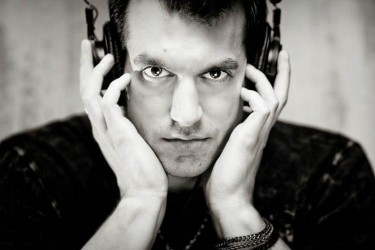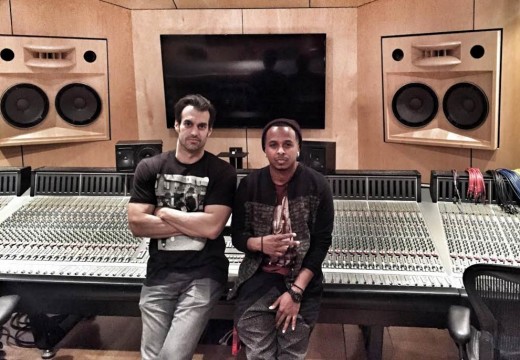Working out of Luminous Sound Studios in Dallas, Texas, Recording Connection mentor Tre Nagella is a top-shelf producer engineer who has worked with major artists like Lady Gaga, Blake Shelton, Christina Aguilera and many others. He’s also a two-time Grammy-winner who is up for a possible third Grammy next month for his work on the latest Kirk Franklin project—namely, the song “Wanna Be Happy?” which is nominated for Best Gospel Performance/Song. Thankfully for our students, Tre also enjoys passing his knowledge and experience on to Recording Connection apprentices, encouraging his students to spend as much time in the studio with him as possible.
In the following interview with RRFC, Tre talks about winning his first Grammy, weighs in on embracing the imperfections that keep the “humanity” in the music, and offers key advice for students about how to make the most of their experiences in the studio.
* * * * *

Recording Connection mentor Tre Nagella
I guess, the first time around…it’s a funny story. I didn’t even know that I would win, honestly, the first time. I always thought that that was something intended for the artist. So the album was nominated, and I knew the album was up, but I had no idea that the engineers and the people associated with the product could win. So it was a pretty big surprise. I actually didn’t find out until about three weeks after the Grammys. That’s when I got a call from the Recording Academy—they wanted to send me paper work to sign for my trophy…I probably sounded like an idiot, asking them, “I’m not sure what you’re talking about.” Then they said, “You are Tre Nagella, right? You did do this album, right? You do know that it won a Grammy, right?”…But as far as how it changed my relationship in the business…I probably thought at the time that all of a sudden, the floodgates would open and my career was going to skyrocket or something magical would happen. And the truth is, it really didn’t. I’m still doing pretty much the same thing I’ve always done. I think the only difference is when people find that out, there is a little bit of instant respect there, a little bit of instant credibility, so people take you a little more seriously…As soon as they see the Grammy winner, all of a sudden people go, “Well, it’s not immature anymore. He’s not messing around, this guy’s serious, he’s for real.” Really, that’s the only big difference.
RRFC: Who have been some of your favorite artists to work with, or your favorite sessions?
Tre: The client that I’m closest with, and have spent the most time with, is a gospel artist named Kirk Franklin. He and I are very good, close personal friends. And at this point, I’ve done five different projects with him, so I’ve probably logged upwards to 5,000 hours in a room with that guy. So I would say that he’s definitely one of my favorites just because we’re very close and we have a lot of fun working together. I’ve worked with Blake [Shelton] on a number of occasions, and he’s a really funny guy. Obviously, he’s a superstar and everyone sees him on The Voice and late night talk shows. And if you’ve ever seen him on television, his personality really comes through, and that personality that you see on television is very much just him…We got the opportunity to spend about four days with Lady Gaga and…it was a few years ago, but she really impressed me with how focused she was and what a clear vision she has for everything.
RRFC: What makes Luminous Sound a great place to record and to learn?
Tre: It’s a world-class studio. We’re in Dallas, Texas but I would put this place on par with anywhere in L.A., New York, Miami and any other world-class type facility, as far as equipment, acoustics, and the people, most importantly. I think that’s probably what makes any facility a top-notch place to record.
RRFC: How do you go about showing people that you are available and you are willing to work with their budget?
Tre: Just talking to people and trying to be personable and humble. It’s not necessarily about me being perceived as high-end—you get what you pay for, so that’s not necessarily a bad thing. I would rather be perceived as high-end and expensive than cheap and whatever…But I have to make sure to tell people, “Hey, I’m open, I’m open to working on your stuff,” and I make sure to tell people that it’s not all about the money for me. I just still want to work on great projects, I want to work with people that I really like working with.
RRFC: You’re passing along that knowledge to a budding generation of engineers as well.
Tre: Yes. I had a number of mentors when I was young, coming up, in my early teens, early 20s. I did the typical rounds of entering the studios and assisting other engineers that were more experienced than I was and had some really good guys who were open to share their knowledge, teach me or let me watch, just sit in with them. And they kind of…it helped me learn, and it motivated me to do this. So now is my opportunity to do the same thing for someone else…I can’t take everyone, but if I can…if I get a good student, I get to share the knowledge and I still have the passion for doing this. So it’s fun for me to explain it to someone else and see them light up.
RRFC: It seems like we’ve become addicted to screens in the studio, with the DAW and tracking on the grid. Do you think working on a grid has taken away the pocket over time?
Tre: Everyone loves the visual, and that’s fine, it’s certainly helpful, but…we didn’t always have the screen to look at. The most important thing is using your ears. You have to learn to tune the visual out and use your ears sometimes…Cutting things to a click track is important. I’ve done some projects, where we do what I call “freewheeling it” where it’s not done to a click, and we just roll tape and let them play. And unless you have a bunch of amazing players, that can get a little messy. So I don’t mind the metronome and the grid, I think that helps. What I think kind of sucks the life out of everything is all the technology. We’ve had metronomes for decades; that, I think, is fine. It’s the beat detecting every single drum hit so that it’s perfect. It’s just not human anymore. It’s fantastic for guys that maybe aren’t the best players that struggle, and so I’m able to take someone that can’t play all that great and actually make them pretty decent. But for the players that are good players or great players, why do we need to do that to them? They’re already great players. My favorite drummers that I get to work with, the reason I like them is because of their feel. They’re not always perfectly metronomical. It’s okay to rush things a tiny bit and push the beat, or it’s okay to lay back a little bit behind the beat, that’s what gives it a feel…When you go back and listen to a lot of the old stuff, like maybe old Motown stuff, you can feel they probably didn’t cut that to a click. And they’re certainly speeding up or slowing down, but the whole band is doing it together and it still feels great. And that’s why I think those records and songs have endured the test of time, because it’s human, you connect with it. There’s some humanity left in the music.

Recording Connection mentor Tre Nagella
and Dez Ward at Luminous Sound
When I met Dez, he seemed really motivated…He was a pretty good piano player and he had already had some sort of DAW at home that he was working with and he had been making tracks on his own…He just seemed real motivated and really friendly, and we just hit it off. He’s been one of my favorite students.
RRFC: Dez mentioned the Kirk Franklin sessions that he got to participate in really changed his life, that watching the creative process really inspired him. Do you remember anything from when he was hanging around that you started to see things click?
Tre: For him to get to sit in and see the caliber of musicians that play on those things and the hours we pull, and how much work goes into an album of that caliber, I think it’s probably an eye-opening experience. I know it was for me, when I was young… I’m glad he got to sit in on a number of those sessions and see what making a big record is like.
RRFC: Was he was able to maintain that fly-on-the-wall status and sort of speak when spoken to?
Tre: Yes, he’s really good at that, and that’s a big deal to me…My job is to facilitate [clients] to create, so it really bothers me when you get a guy that’s trying to talk to the client all the time, they’re trying to show them their beats they made at home and trying to get their phone number. You can’t do that, it’s not really appropriate. There is a studio etiquette. Write your questions down so that you can remember, and then when we’re alone and you want to ask me what was I doing, I’m more than happy to answer. But while the client’s paying big dollars to be in there and trying to create his album, that is not the time you start blurting out questions and trying to show some superstar tracking in your bedroom…Dez is really good with that, I don’t really need to tell him. I think, because of his age and maturity level, he gets that and I don’t really even have to say it, he just understands that.
RRFC: What advice do you have for apprentices to make the most out of the time they spend with you in sessions?
Tre: I think the things they could do to get the most out of the Recording Connection is just spend time at the studio…I can’t spend hours and hours and hours every day with you, I just don’t have the time. We’re going to do the lessons, that’s obvious, but you are welcome at the studio. The more you can be here and just be around…it may be boring sometimes, it may not always be something to do, but that’s when opportunities pop up…something happens all of a sudden and you’re there to jump on the opportunity or watching the other engineers. It doesn’t always have to be me that you might learn from, you might learn from another engineer that’s working in another room, go help them, go assist them even though I’m busy…I try and encourage the guys, “Come up here as much as you can, you’re always welcome, it’s not required but any time you want to come, just let me know.” I tend to let my students know when I’m there after hours, on weekends and just let them know ahead of time, I’m going to be here all day on Saturday just mixing by myself. So if you want to come up, you can sit over my shoulder and watch me or you can go in another room and do whatever you want. And the students that tend to excel are the ones that take me up on that.
* * * * *



